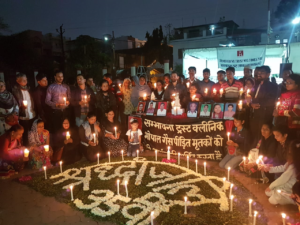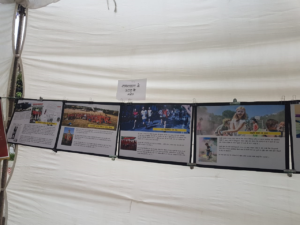 On the evening of December 2nd, exactly 35 years after the original Bhopal gas disaster, the Sambhavna Trust held a candle lit march through the streets of Bhopal, from Kamla Park to Iqbal Maidan, in honour of all those who have died in the course of those three and a half decades. They carried with them pictures of twenty-eight activists and campaigners for Bhopal, many of whom have lost their lives during the long course of the struggle for justice.
On the evening of December 2nd, exactly 35 years after the original Bhopal gas disaster, the Sambhavna Trust held a candle lit march through the streets of Bhopal, from Kamla Park to Iqbal Maidan, in honour of all those who have died in the course of those three and a half decades. They carried with them pictures of twenty-eight activists and campaigners for Bhopal, many of whom have lost their lives during the long course of the struggle for justice.
At the end of the march members of the Sambhavna trust gathered together at Iqbal Maidan and held a vigil in memory of the more than 25,000 people who have died due to gas exposure since that fateful night in 1984. They also carried pictures of the following twenty-eight individuals in recognition of their incredible contributions to the fight for justice and support for their fellow survivors: Abdul Raheem Khan, Indu Bai, Ahmed Bee, Inayat Ullah, Abdul Kalam, Pratap Sahu, Ibrahim Khan, Bhagwati Bai, Motilal, Chand Miyan, Mohd. Saleem, Mohd. Anees, Raeesa Bee, Yamin, Rashida Bee, Leeladhar Vishwakarma, Vishnu Ahirwar, Shaikh Majeed, Shakoor Khan, Hemraj, Hema Sonani, Hazra Bee, Ganga Ram, Leela Bai Lakhera, Amar Singh Yadav, Shivani Rathore, Nirmeerti Bai, and Bankelal Pasi.
 Additionally, from the 1st to 3rd December, the Sambhavna Trust held an exhibition at Iqbal Maidan, the site of the conclusion of the march. The exhibition showed the work done by supporters and fundraisers of the BMA in the UK to raise money for the Sambhavna and Chingari clinics. They also showed regular screenings of four films depicting the tragedy and the ground-breaking innovations in community healthcare taking place at Sambhavna over the past twenty-five years. The four films are Secrets and Lies, Hush Baby, Bhopali, and Sabki Bhagidari se Sabki Sehat (‘Everyone’s Health with Everyone’s Participation’).
Additionally, from the 1st to 3rd December, the Sambhavna Trust held an exhibition at Iqbal Maidan, the site of the conclusion of the march. The exhibition showed the work done by supporters and fundraisers of the BMA in the UK to raise money for the Sambhavna and Chingari clinics. They also showed regular screenings of four films depicting the tragedy and the ground-breaking innovations in community healthcare taking place at Sambhavna over the past twenty-five years. The four films are Secrets and Lies, Hush Baby, Bhopali, and Sabki Bhagidari se Sabki Sehat (‘Everyone’s Health with Everyone’s Participation’).
Below is a Press Statement from members of the four survivors’ organisations on the night of the candlelit vigil on the state of the campaign after 35 years of struggle.
Press Statement from Bhopal:
On the eve of the 35th Anniversary of the Union Carbide disaster in Bhopal, leaders of four survivors’ organizations condemned the continued apathy of both the national and state governments towards the medical, economic, and social rehabilitation of the survivors.
Rashida Bee, President of the Bhopal Gas Peedit Mahila Stationery Karmchari Sangh said, “The long and painful sickness and recent death of Abdul Jabbar, leader of a survivors’ organization, exemplifies what almost every patient visiting the state and central run hospitals goes through. Until today there is no evidence that the governments at the state and the centre have learnt any lessons from Jabbarbhai’s suffering and untimely death.”
“The neglect of the Bhopal survivors’ health condition is evident in the way the Bhopal Memorial Hospital & Research Centre (BMHRC) is run by the central government. For the last several years the departments of Nephrology and Surgical Oncology remain closed and there are no specialists in Neurology, Pulmonary Medicine, surgical gastroenterology and gastro medicine. Also for the last 7 years no research has been done in this hospital that is run by the Department of Health Research, Government of India. Of the 16 new research projects listed by ICMR’s centre in Bhopal, only 3 are related to the disaster” said Nawab Khan, President of the Bhopal Gas Peedit Mahila Purush Sangharsh Morcha.
Citing the commendable work done by Professor Srinivasa Murthy, an international expert on post-disaster mental health care, in Bhopal, Rachna Dhingra of Bhopal Group for Information & Action commented on the utter lack of mental health care to the survivors of the Bhopal disaster. “The Department of Bhopal Gas Tragedy Relief & Rehabilitation of the state government runs six big hospitals with over 4000 patients visiting them every day. Five of these hospitals have not had a Psychiatrist for the last 19 years. The one hospital that had a Psychiatrist, had him as a part time consultant for 12 hours a week till he left last month. Professor Murthy who had found 30% of the exposed population to be mentally ill in 1985, found to his regret that 25 years later 80% had not recovered from their mental illnesses. He found survivors in Latur, Chernobyl, Iraq and other places in the world to be recovering within two to three years of the mass disaster.”
“Documents we have got through the Right to Information show that of the 104 Crores allocated by the central government for economic rehabilitation of victims, 18 Crores have been lost to corruption and the rest 86 Crores remain unutilized for the last nine years. And this when thousands of survivors’ families are facing starvation due to lack of gainful employment. 473 women widowed by the disaster have been denied a monthly pension since last year citing lack of funds” said Nousheen Khan of Children against Dow Carbide.


